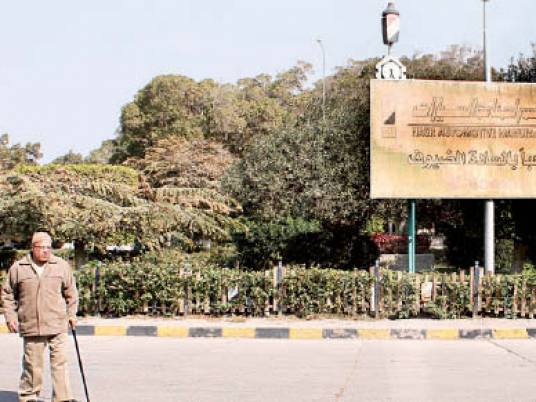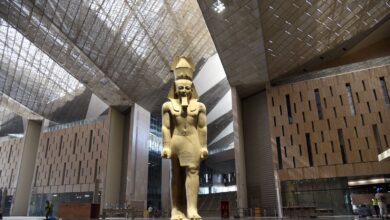
After a hiatus of four years, a group of workers of state-owned giant Nasr Car Manufacturing Company are daring to hope that they might be able to return to their jobs.
In early February, the Shura Council said it would end the liquidation process of the company, which had shut down portions of the factory gradually over the past few years. The Shura Council decision said the company would prepare to open its doors once again.
Nasr Car Manufacturing, established in 1960, was the first car-production factory to open in the Middle East.
It was responsible for introducing the famous Italian Fiat 1100R model to Egypt’s streets. It produced cars up until the liquidation ruling in 2009, rolling out the Zastava Florida, a 1980s hatchback design by the Serbian company Zastava.
The designs were so old-fashioned that many Egyptians thought the company had stopped producing decades ago.
Beginning in 2009, the government had tried to force most of the workers into early retirement, but a stalwart group refused to be let go without what they consider a severance payment and accepted jobs in the factory’s storage facilities rather than leaving.
This group cheered when they heard about the Shura Council’s decision.
Saeed Gaber, one of the company’s workers, says the government has been slowly starving the company, in an effort to close it without compensating the workers.
He and his colleagues were deprived of promotions and large chunks of their incentives. Allowances had also been deducted since the early retirement program was initiated.
But their hopes faltered following the latest development. After a meeting with the Metallurgical Industries Company, officials suspended the liquidation procedures and postponed re-launching the company.
Before beginning full operations again, Zaki Bassiouny, head of the liquidation committee, said a merger of the company must take place, with either the Military Production Ministry or the Engineering Automotive Manufacturing Company.
The workers say they see this as another way for the government to continue with the company’s liquidation, in the disguise of a merger. They accuse Bassiouny of ignoring the Shura Council resolution to re-launch the company.
A slow, deliberate death
Gaber and other workers also accuse the government of sabotaging the company to shut it down and minimize losses.
Since 2009, Gaber says liquidators have spent LE253 million trying to close the company, which he says could have been used to restart operations, develop the company or lessen its debt.
He has knowledge of offers the liquidators turned down. The company was approached by investors looking to make use of its Elbo line, which painted cars to protect them against oxidation. The project would have made LE7 million, but owners turned it down.
“That would have been enough to re-open, provide workers’ salaries and achieve a profit margin worth least LE5 million, but the administration, for no obvious reason, refused to do so,” he says.
Adel Abdel Atty, head of the General Union for Engineering, Metallurgical and Electrical industries and adviser to the manpower minister, says the government has been behind an effort to liquidate, at minimum cost, the Nasr Car and other public sector companies.
The Hosni Mubarak government sought to liquidate the majority of these companies during its broad privatization program, which began in 1996.
Known euphemistically as “structuring employment,” the Mubarak regime touted privatization as an answer to the country’s stalling economic growth. International finance institutions encouraged the trend, seeing it as encouraging a free-market economy.
But in the case of the former regime, Abdel Atty says, this usually involved cooking the books to justify the privatization.
Abdel Atty says that during this period, the government would deliberately load the companies with losses to drive them to bankruptcy or liquidation so they could then be privatized.
Because Nasr Car was such a huge company, the government could not close it in one fell swoop, he says, instead choosing to initiate a slow end of operations.
Moussa Abdrabo Moussa, a worker at Nasr Car, agrees with Abdel Atty. He says the company took on more debt than it had actually incurred.
“In 1999, we were surprised that losses had reached LE100 million, despite the achieved high revenue, without knowing the cause of such loses,” he says.
Competing in today’s market
But despite workers’ commitment to the company, some wonder how a communism-inspired state-run company can stay relevant today in Egypt’s competitive car market, dominated by affordable Asian models.
In 2000, officials hired a German expert to decide on the future of the company, who recommended that they divide it into smaller companies. Officials took his advice and split the firmin 2005.
After the decision, the company separated the Engineering Automotive Manufacturing Company from Nasr Car, but did not transfer any of the debt. Engineering Automotive Manufacturing maintained half of the land, factories, raw material and cash of Nasr Car, and a part of the skilled workforce.
Documents from the Central Accounting Authority, shown to Egypt Independent by Gaber, indicated that in 2009, Nasr Car’s debt stood at US$1.6 billion. The government used this as a reason to shut the company down and made clear disincentives against employees staying.
“As a result of the pressure exerted by the company’s management, workers decided to take early retirement, either fearing the wrath of the administration or in anticipation of a retirement bonus, which amounts to LE200,000,” Moussa says.
Gaber and Moussa are two of the 239 workers resisting the company’s attempts to force them into early retirement.
They believe they are protecting an Egyptian institution, the sole producer of cars in the country. They are proud to produce affordable, domestic-made cars. They say that without the steadfastness of these workers, the government would have succeeded in its plan to eliminate the company years ago.
Moussa and Gaber now both work in the company’s only remaining operation, its storage facility, after previously being paid more as welding technicians.
The Metallurgical Industries Company is set to convene again on 10 April to review the budget and issue its decision on whether the company should be brought back to life.
Abdel Atty says there is a real possibility the company could begin production again. He says the Nasr Car factories and the facilities are capable and efficient, and the move would also create 3,000 jobs.
He worries, though, about the long-term capabilities of a producer like Nasr Car. He sees no great strides in the medium and long term.
The company’s cars were intended to be affordable for the average person of means, he says, and it was not meant to compete with the affordable compact cars now available from other parts of the world.
Nasr Car was founded to build foreign-licensed cars in Egypt to avoid the engineering and design problems associated with earlier attempts at domestic car manufacturing, he says.
For this purpose, he says, the company succeeded. It is possible, he believes, that the company can do it again.
“We can overcome these obstacles this time round and try to produce a 100 percent Egyptian car with an affordable price and pristine qualities able to compete in local markets and to be exported to surrounding African countries,” Abdel Atty says.
There are others, some in high places, who have similar hopes.
“The factories could resume production immediately,” says Abdel Azim Abdel Al, head of the Shura Council Human Development Committee. “The resumption of production at Nasr factory will definitely boost Egypt’s industry and be vital to its economy.”
Abdel Azim believes most of the companies liquidated under the former regime fell victim to corruption.
He recalls the committee’s visit to the company’s headquarters last January, when workers presented the delegation with a petition to stop the liquidation of the company and pay the workers’ delayed dues. He was impressed by their determination.
If Nasr Car Manufacturing Company returns to operation, he says, it will provide thousands of jobs for young people. To him, with such a committed group of employees, the company stands a good chance of succeeding.
“I would bet on their ability to restart the company and promote it again,” he says.




